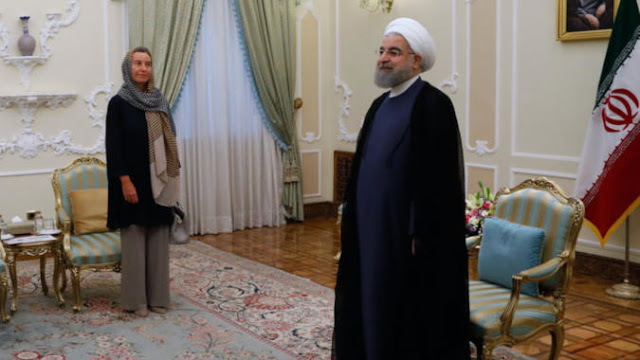I invite you to read this article.
Hamid Bahrami is a former political prisoner from Iran. Based in Glasgow, he is a human rights activist and works as a freelance journalist. Bahrami tweets at @HaBahrami.
The formal inauguration ceremony of Rouhani’s second presidential term was held earlier this month. The High Representative of the Union for Foreign Affairs and Security Policy, Federica Mogherini, attended the event as a special guest.
The Italian Commissioner is known to be one of the EU officials who supports a policy of appeasing the Iranian regime.
The EU’s foreign policy chief also met President Hassan Rouhani, Foreign Minister Javad Zarif and the Foreign Policy Advisor of the Supreme Leader, Ali-Akbar Velayati.
Mogherini’s presence at the ceremony sends a shameful message and gives a green light to the Iranian government to continue its suppression of human rights in the country.
Economically, it is a fact that Iran presents a tempting opportunity for the EU. But aside from Iran’s malign actions in the Middle East and continued support for terrorism, one should ask the following question: Is the EU concerned about the human rights situation in Iran?
In reality, the EU has never put serious pressure on the Iranian government over human rights. Experts, human rights activists and members of the Iranian opposition have consistently asked the EU to make any economic relations with the regime in Tehran contingent upon verifiable improvements of the human rights situation and an end to executions, but the EU has always preferred trade.
It is a fact that since the revolution in 1979, the Iranian people have suffered greatly due to systematic human rights violations by the government.
In its new 90-page report
Caught In A Web Of Repression, Amnesty International describes and documents a vicious crackdown on human rights activists under President Rouhani. The report draws the conclusion that the “Iranian authorities laid the foundations of a repressive state apparatus,” revealing the catastrophic human rights situation in the country.
One particular case in this regard, among many highlighted in the Amnesty report, is that of Maryam Akbari-Monfared, who is serving 15 years in prison on bogus charges.
According to Amnesty International, Akbari-Monfared is facing additional hardship in prison for filing a formal complaint to seek justice over a 1988 massacre in Iran in which tens of thousands of political detainees, a majority from the opposition, the PMOI, were executed en masse in prisons across the country.
Indeed, during the massacre, two of her siblings were executed. The Iranian government has punished Ms Akbari-Monfared by denying her medical treatment vital to her health and by threatening to stop her family visits.
The activist’s courage has given momentum to the global campaign calling for an end to the impunity and prosecution of the perpetrators of this horrific massacre.
The experience of Hassan Rouhani’s first term in office shows that there is a correlation between a policy of appeasement and an increasing number of executions and public hangings in Iran. This fact was proven in 2015 when nearly 1000 persons were executed in the country exactly as the world powers were negotiating a nuclear deal with Tehran.
Federica Mogherini should indeed be asked how she managed to persuade herself to continue relations with the Iranian officials despite constant reports of the deteriorating human rights situation and an increasing number of hangings in the country.
Considering the regime’s weak position in both domestic and foreign affairs, it is high time to pressure Iran to improve its respect for human rights.
Today, human rights defenders in Iran are in a grievous condition. They are the primary victims of the EU’s policy of appeasing the mullahs.
To end this crisis, oil traders must recognise and acknowledge the right and need to defend human rights in Iran.




Comments
Post a Comment